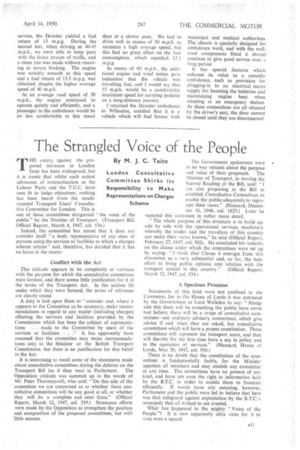The Strangled Voice of the People
Page 45

If you've noticed an error in this article please click here to report it so we can fix it.
THE outcry against the proposed increases in London fares has been widespread, but it is ironic that whilst such ardent advocates of nationalization as the Labour Party and the T.U.C. have seen fit to lodge objections, nothing has been heard from the muchvaunted Transport Users' Consultative Committee for London. This is one of those committees designated "the voice of the public" by the Minister of Transport. (Transport Bill, Official Report, March 4, 1947, col. 534.) Indeed, the committee has stated that it does not consider itself "a body representative of any class of persons using the services or facilities to which a charges scheme relates" and, therefore, has decided that it has no locus in the matter.
Conflict with the Act This attitude appears to be completely at variance with the purpose for which the consultative committees were formed, and there seems little justification for it in the terms of the Transport Act. In the section (6) under which they were formed, the terms of reference are clearly stated.
A duty is laid upon them to "consider and, where it appears to the Committee to be necessary, make recommendations in regard to any matter (including charges) affecting the services and facilities provided by the Commission which has been the subject of representa tions . made to the Committee by users of the services or facilities. . . ." It has apparently been assumed that the committee 'may make recommendations only to the Minister or the British Transport Commission, but there is no justification for this belief in the Act.
It is interesting to recall some of the statements made about consultative committees during the debates on the Transport Bill (as it then was) in Parliament. The Opposition attitude was summed up in the words of Mr. Peter Thorneycroft, who said: "On this side of the 'committee we are concerned as to whether these consultative committees will be any good at all, or whether they will be a complete and utter farce." (Official Report, March 12, 1947, col. 519.) Strenuous efforts were made by the Opposition to strengthen the position and composition of the proposed committees, but with little success. The Government spokesmen were in no way reticent about the purpose and value of their proposals. The Minister of Transport, in moving the Second Reading of the Bill, said: "I am also proposing in the Bill to establish Consultative Committees to enable the public adequately to represent their views," (Hansard, December 16, 1946, col. 1625.) Later he repeated this statement in rather more detail.
"The whole purpose of this structure is to build up, side by side with the operational services, machinery whereby the trader and the travellers of this country can make their views known," he said (Official Report, February 27, 1947, col. 502). He concluded his remarks on the clause under which the committees were set up by saying: "1 think that Clause 6 emerges .from this discussion as a very substantial and, so far, the best, effort to bring public opinion into relation with the transport system in this country" (Official Report, March 12, 1947, col. 534.) A Specious Promise Statements of this kind were not confined to the Commons, for in the House of Lords it was entrusted by the Government to Lord Walkden to say: "Alongside this there will be something the public have never had before; there will be a range of consultative committees—not ordinary advisory committees, which give advice if and when they are asked, but consultative committees which will have a proper constitution. Those committees will represent the transport users, and they will thereby for the first time have a say in policy and in the operation of services." (Hansard, House of Lords, May 20, 1947, col. 930.) There is no doubt that the constitution of the com
mittees is fundamentally feeble, for the Minister appoints all members and may abolish any committee at any time, The committees have no powers of any kind, and have not even the right to information held by the B.T.C. in order to enable them to function efficiently. If words have any meaning, however, Parliament and the public were led to believe that here was that safeguard against exploitation by the B.T.C.'s monopoly that all wished to see created.
What has happened to the mighty "Voice of the People "? It is now apparently ultra vires for it to raise even a squeak




























































































